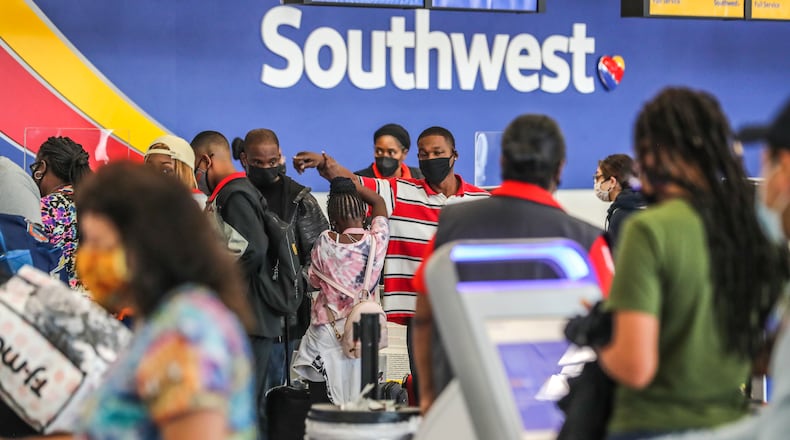When Southwest Airlines flew its Boeing 737s into Atlanta for the first time on Feb. 12, 2012, many expected the powerful discount carrier to shake things up at the world’s busiest airport.
A decade later, Southwest remains a very distant No. 2 to Delta Air Lines, which continues to dominate traffic at Hartsfield-Jackson International Airport with a roughly 80% market share.
In fact, since arriving, Dallas-based Southwest has seen its market share slip below 10%. And it has scaled back its ambitions after earlier vowing to significantly expand flights in Atlanta.
“We’re a good size in Atlanta,” Andrew Watterson, Southwest’s chief commercial officer, said a few days before Southwest’s 10-year anniversary here.
That’s a disappointment to consumers who hoped Southwest would bring its national low-cost carrier strength to Atlanta to amp up the competition, giving hometown Delta a run for its money.
Southwest gained entry into Atlanta by acquiring AirTran Airways, a low-cost carrier that had its primary hub at Hartsfield-Jackson. But Southwest only has 9% of total passengers here, down from Southwest-AirTran’s roughly 15% market share a decade ago.
Henry Harteveldt, a travel industry analyst for Atmosphere Research Group, said when Southwest acquired AirTran, it “made a very big deal” about acquiring an Atlanta hub.
“Frankly Southwest has squandered the opportunity that AirTran gave them to start with a sizable presence in the market and grow,” said Harteveldt. He believes Southwest bought AirTran “to take out a competitor,” not build market share in Atlanta.
It’s unclear how much Southwest’s arrival helped drive down fares for consumers, if at all.
Watterson said Southwest has provided “good price discipline” and lowered fares on routes it serves from Atlanta by 10% to 14% between 2012 and 2019. “We think that we provide great value to the city by being that kind of strong No. 2,” he added in an interview with The Atlanta Journal-Constitution.
But gauging what causes airline fares to rise and fall is notoriously tricky amid complex and constantly changing pricing that spans different cabin classes and includes various add-on fees for everything from extra luggage to early boarding.
Air fares have fallen the last two years as traffic declined because of the pandemic, after inching up between 2017 and 2019. On an inflation-adjusted basis, average Atlanta fares in the the third quarter of 2021 were nearly 20% lower than in the same quarter of 2019, and nearly 25% lower than in 2012, according to federal data. Federal data show Southwest has the lowest average fares on some routes from Atlanta, but not always.
A key reason Southwest hasn’t grown into a bigger rival to Delta in Atlanta is their differing approach to their route network.
While Delta depends on Atlanta as its largest hub and a gateway to Latin America, Europe and Africa, Southwest operates a “point-to-point” network without traditional connecting hubs and mostly focuses on domestic flights.
Hub carriers like Delta funnel passengers from big cities and small towns into a transfer hub to fill a plane headed to another destination. The result is that Atlanta has significantly more Delta flights than the city would get based on local demand alone.
Southwest focuses primarily on direct routes between two cities that already have enough local demand to fill a 737. That rules out service to many small towns and limits its breadth. The airline says its market share has actually expanded when measuring just passengers who start or end their trips in Atlanta instead of passing through.
Atlanta is now Southwest’s 11th-largest city. While AirTran operated about 220 daily flights from its Atlanta hub, Southwest has less than half that, with up to 106 daily flights at Hartsfield-Jackson on more than 40 nonstop routes.
And while AirTran had international flights from Atlanta to Mexico and the Caribbean, Southwest made Houston Hobby its international gateway and currently has no cross-border flights from Atlanta on its route map.
Watterson said Southwest remains dedicated to Atlanta, with 2,700 employees here. Most airlines have scaled back flights during the pandemic, and Southwest is focused on bringing its service back to pre-pandemic levels “over the next year or so.”
“We liked our size in Atlanta before the pandemic,” said Watterson, adding service is at about 70% of pre-pandemic levels currently.
Yet to be seen is how a recently announced merger between ultra low-cost carriers Spirit and Frontier Airlines could affect competition. Watterson said he doesn’t expect it will change where Southwest flies.
Harteveldt thinks Atlanta presents a growth opportunity for a combined Spirit-Frontier. Southwest “may have very attractive fares but they’re no longer the lowest-priced airline,” he said.
“I think Spirit and Frontier look at a market like Atlanta and say, ‘We can grow there and win,’” Harteveldt said. “Southwest is likely going to be more vulnerable.”
About the Author
The Latest
Featured



